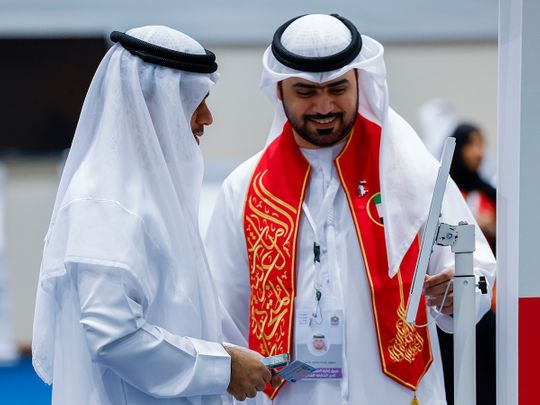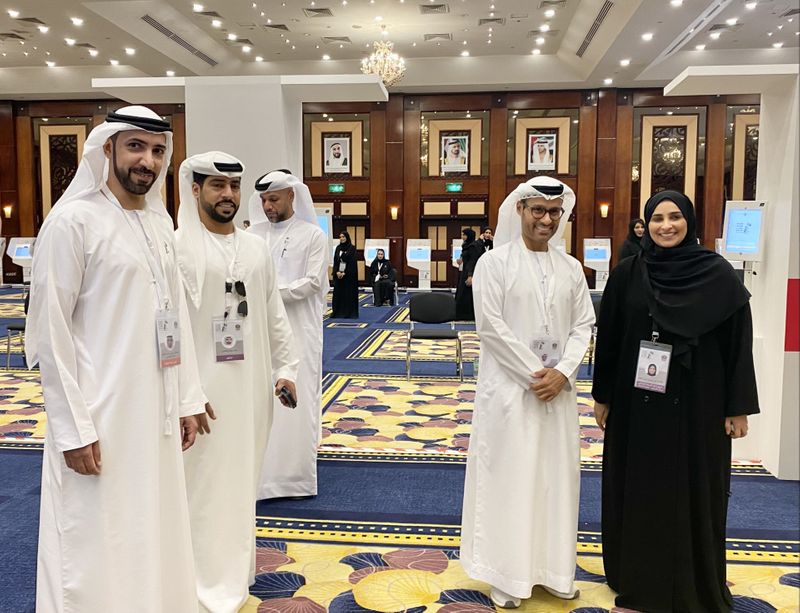
Dubai: In a historic move towards embracing the digital age, the UAE’s Federal National Council (FNC) has successfully conducted its first-ever hybrid election that lasted for four days. With robust cybersecurity measures in place, the UAE has set a new benchmark for secure and efficient elections on the global stage.
For the first time, Emiratis could participate in the electoral process through the official app or website from inside or outside the country. Voters could also exercise their voting rights in the conventional way of physically visiting 24 main polling centres across the country on Saturday.
In an exclusive interview with Gulf News on the final and main day of the election on Saturday, Mohammed Hamad Al Kuwaiti, the head of the UAE Cybersecurity Council, shed light on the cybersecurity measures taken to safeguard this transformative electoral process. The cybersecurity chief spoke as he visited the main polling centre in Dubai, at the Dubai World Trade Centre (DWTC).
Al Kuwaiti pointed out that this election is a pivotal part of the broader digital transformation that the UAE has undertaken across all sectors.
“The election is part of the transformation into a digital world,” he said.
The government’s unwavering support and commitment to ensuring the ease and efficiency of the electoral process played a significant role in this milestone, he highlighted.
Controls and encryption
The cybersecurity chief said the key to the security of the hybrid election lies in encryption, advanced security measures, and robust information assurance.
He explained that end-to-end encryption ensures the confidentiality and integrity of the voting process, while the Security Operation Centre (SOC) closely monitors various aspects of the system.
Additionally, the election system complies with over 188 cybersecurity controls, guaranteeing that the highest international standards are met.
2-factor authentication
Al Kuwaiti also highlighted the multi-layered security approach for the online voting system, which includes two-factor authentication through various means, such as card verification, OTP (One-Time Password), and even facial recognition. These layers of authentication aim to provide voters with the utmost confidence in the security of their voting process.
Privacy top priority
Privacy remains a top priority, Al Kuwaiti said, assuring that stringent measures are in place to protect voters’ personal information.
“Our main goal here is to ensure a smooth and seamless journey in a secure way. The privacy of our information to us is the number one priority. And that’s what we are ensuring here,” he said.
The cybersecurity efforts not only encompass the technical aspects but also the human element, with a skilled and dedicated team overseeing the entire process.
The UAE has benchmarked its election process against international standards and has achieved high-ranking standards in both the systems and the electoral processes employed. The goal, as Al Kuwaiti said, is to make the electoral journey smooth and secure for UAE citizens.
‘Majority voted online’
Meanwhile, a top official of the Dubai Committee for the FNC Elections operating under the National Elections Committee, revealed that elections in Dubai witnessed a significant shift towards digital voting, with the majority of voters choosing to cast their ballots online.
This was revealed by Essa Mohammed Khalifa Al Mutaiwei, chairman of the Dubai Committee for the FNC Elections.

Speaking to Gulf News at the DWTC polling centre, Al Mutaiwei said the use of digital technology for the election in a safe environment contributed to the country’s goals of digital governance and sustainable development.
“I think this is what completes the UAE government’s vision of transforming into a digital government,” he said.
Highlighting the benefit of this digital transition, he said: “It’s making life easier. That is why the majority of the people preferred to vote online this time.”
As the elections entered the final day, Al Mutaiwei said, officials and volunteers encouraged eligible voters to also cast their ballots at the electronic voting machines in the polling centres till 8pm on Saturday.
Eligible Emirati voters in Dubai had the option to exercise their voting rights at three physical voting centres across the city—the Al Multaqa Hall in DWTC, Khawaneej Majlis in Al Khawaneej and Hatta Hall in Hatta.
Al Mutaiwei said arrangements had been made at the polling centres to screen the live coverage of the real-time counting of votes and the announcement of the preliminary list of winners from Abu Dhabi for the candidates, ensuring transparency and real-time updates for all. There are 53 candidates in Dubai this time. According to the National Elections Committee (NEC), a total of 309 candidates including 128 women are contesting this election.







